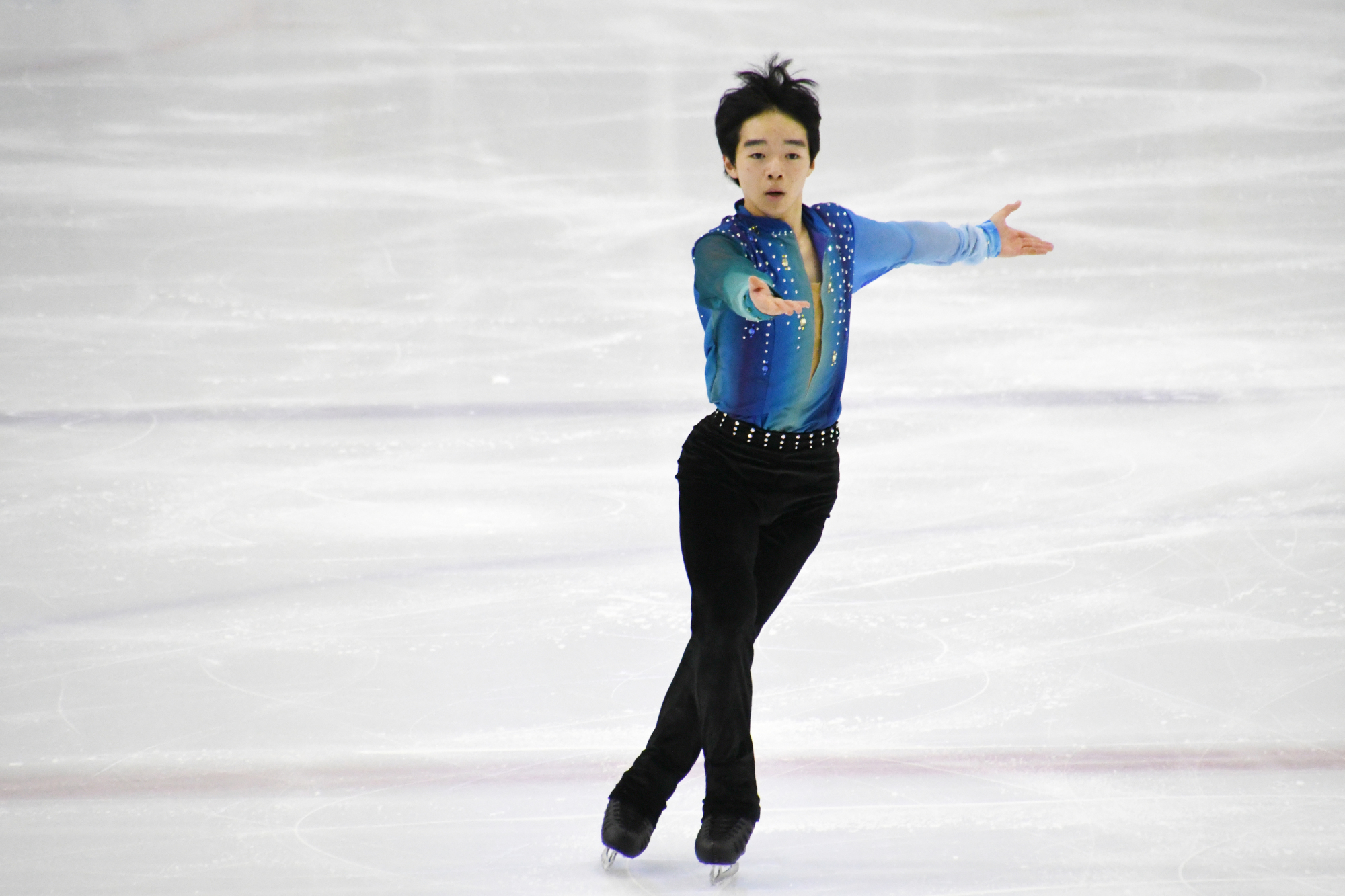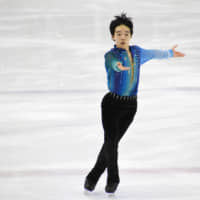A new star was born on Sunday night and his name is Yuma Kagiyama.
The 16-year-old won the Japan junior title in Yokohama by a more than 37-point margin with a stellar performance in the free skate. Kagiyama exhibited poise and power in a thoroughly impressive outing.
In the modern age, with videos quickly available on YouTube, Kagiyama's sublime showing did not take long to resonate around the world.
"Yuma will certainly be going to the Olympics and become one of the top five skaters in the world," a prominent member of the global skating community emailed Ice Time on Monday.
Ice Time concurs with the observation, as Kagiyama, who has qualified for next month's Junior Grand Prix Final, is only going to improve in the coming years. He has the skill, work ethic and demeanor of a real champion.
Kagiyama is coached by his father Masakazu, a two-time Olympian for Japan, who also won the junior title twice himself. Following his son's stirring victory, Kagiyama spoke to the media about his feelings on the triumph.
"When he was on the rink, I told him to believe in himself," Kagiyama recalled. "I'm his instructor and also his father. I believe my son did a really good job."
The elder Kagiyama, who is now 48, was then asked about Yuma carrying on the family's Olympic tradition.
"If he wants to go there, I will think about what he wants and hopes to do," Kagiyama stated. "I will try to pave the way for the future."
Kagiyama, who was a three-time Japan champion, then discussed his son's drive.
"As his instructor, Yuma's strength is that he does not spare any efforts," Kagiyama noted. "He will practice until he is satisfied with the skating."
The senior Kagiyama had some health issues in 2018 that prevented him from working with Yuma on his skating, and talked about how the teen grew as a result of his absence.
"Last year I was sick, so I could not instruct him technically, but Yuma became more independent," Kagiyama commented. "Meanwhile, (choreographer) Misao-sensei (Sato) taught him expression. If Yuma did not learn about expression from Misao-sensei, then he could not get good scores in this competition."
Kagiyama discussed his son's skating in specifics.
"Yuma likes to dance, so he has already good skill about steps and so on," Kagiyama remarked. "His weakness is jumping, but he is now getting used to it and seems to enjoy learning about it."
Kagiyama tmentioned the only thing that could derail Yuma in the future.
"The next task is, Yuma already has skating skills and mental strength," Kagiyama said, "he needs to give priority to building up his body so he does not get injured so easily."
Quad proposal made
Last week a Russian website (rsport.ria.ru) reported that the Russian skating federation has asked the ISU to consider allowing women to do quadruple jumps in the short program.
The president of the federation, Anatoliy Samokhvalov, confirmed the move at a news conference in Moscow. The next ISU Congress will be held in the summer of 2020 in Thailand, where a decision on the request could be made.
With Russian women dominating the Grand Prix circuit this season, having won all four events, one wonders if for the sake of competitive balance this is a good idea.
Ice Time reached out to several prominent people in the skating world to get their take on the proposal.
"I think it should be allowed. It doesn't seem like it can be stopped," a veteran Japanese coach wrote in an email. "But maybe only senior ladies and junior men should be allowed to do the triple axel (in the short program), and quads for the junior men."
Legendary skating writer Phil Hersh had some interesting observations on the topic.
"Some felt that no quads in the short was the counterbalance against the jumps becoming the decisive factor in every competition," Hersh wrote Ice Time in an email. "That theory took a hit when (Alexandra) Trusova wiped out Kihira's big lead at Skate Canada. I know Rika made mistakes, but even a flawless free likely would not have held off Trusova."
Hersh then cited coach Eteri Tutberidze and her endless stream of prodigies as a possible reason for nixing the proposal.
"The skating world sees Eteri's assembly line (Sofia Akatyeva, 12, is this year's model) and some would like to throw a wrench into the works," Hersh continued. "Allowing quads in the short would have the opposite effect. Voting against it will be seen as anti-Russian.
"I think the change is inevitable but should wait until after the next Olympics."
ISU announcer Ted Barton also gave Ice Time his take on the matter.
"Well many people will say they want the quads in the short because their skaters do it and many others cannot at this moment," Barton wrote in an email. "So the question is philosophical in that do we want rules to limit physical abilities and rules to even the playing field for those who can't at least for the moment. Or do we want the strong to be allowed to pursue what is possible?"
Added Barton: "I believe that if they go to a technical program and an artistic program then for sure they should open up for quads. I do not know enough about the background of their thoughts, but will find out soon."
USA Today columnist Christine Brennan, a veteran skating writer and author of multiple books on the sport, worries that artistry will be sacrificed even more if the proposal is approved.
"Considering all the young Russians who can land quads, it's no surprise that the Russian federation is encouraging this change," Brennan wrote in an email. "I'm guessing that the train is leaving the station on this one. It is a sport after all.
"But once this happens, I do think we will lament — again — the continuing loss of artistry in figure skating," Brennan continued. "Let's hope judges remember to separate the component scores from the technical scores. That would be a benefit both to skaters and to the longevity of the sport."
The issue of allowing women to do quads in the short program is not only one of nationality, but also a health issue, in Ice Time's view.
Should young women, whose bodies are still growing, be encouraged to do even more four-revolution jumps?
I think this is a fair question.
Miyahara has chance at Final
It was another week of disappointing results for Japan on the Grand Prix circuit, with Satoko Miyahara and Shoma Uno both posting fourth-place finishes at the Cup of Russia in Moscow.
Trusova, who landed three quads in her free skate, won the women's competition with a total score of 234.47 points, with Miyahara far behind at 192.42.
Miyahara still has an outside shot at making the GP Final based on her second-place showing at the Cup of China, but will have to wait and see what happens this week at the NHK Trophy.
Yuhana Yokoi (182.68) came in sixth in her senior GP debut, rallying from 10th place after the short program.
Alexander Samarin (264.45) led a Russian sweep of the men's podium, with Uno (252.24) missing out on third place by just over half a point to Makar Ignatov (252.87).
The result was a significant improvement for Uno after coming in eighth at the Internationaux de France two weeks ago in Grenoble. Uno seemed to enjoy his brief collaboration with Stephane Lambiel and it will be interesting to see if he decides to make the relationship more permanent going forward.
Hanyu tops NHK Trophy field
The GP circuit makes its final stop of the regular season in Sapporo this week for the NHK Trophy. Two-time Olympic champion Yuzuru Hanyu and last season's Grand Prix Final winner Kihira are the headliners, along with Olympic and world champion Alina Zagitova of Russia.
After winning Skate Canada last month, Hanyu will be looking to lock up a berth in the GP Final with a victory. Kihira will try to do the same after taking second place at the same event in British Columbia.
Hanyu, who missed the GP Final the last two seasons due to injury, will take on a field that includes compatriots Sota Yamamoto and Koshiro Shimada, in addition to France's Kevin Aymoz and Jason Brown and Tomoki Hiwatashi of the United States.
Mako Yamashita and Yuhana Yokoi will join Kihira in the lineup in Hokkaido, along with Russia's Alena Kostornaia and South Korea's Lim Eun-soo.




















With your current subscription plan you can comment on stories. However, before writing your first comment, please create a display name in the Profile section of your subscriber account page.